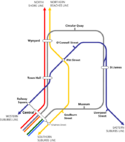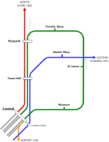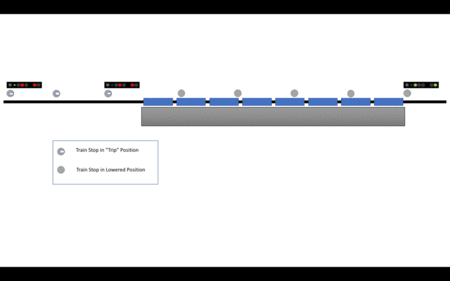City Circle facts for kids
Quick facts for kids City Circle |
|
|---|---|
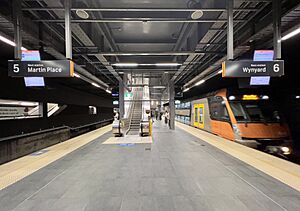
Town Hall station, a major interchange and one of the busiest stations on the City Circle
|
|
| Overview | |
| Owner | Transport Asset Holding Entity |
| Termini | Central |
| Stations | 6 |
| Service | |
| Services | T2 Inner West & Leppington Line T3 Bankstown Line T8 Airport & South Line |
| Operator(s) | Sydney Trains |
| History | |
| Opened | 20 December 1926 (first segment) 22 January 1956 (entire loop) |
| Technical | |
| Line length | 6 km (3.7 mi) |
| Track gauge | 1,435 mm (4 ft 8 1⁄2 in) standard gauge |
The City Circle is a special railway line in Sydney, Australia. It runs mostly underground in the city center. This line is super important for Sydney's train network. It helps people get around the city easily.
Even though it's called a "Circle," it's actually shaped more like a "U" or a horseshoe! Trains go around it in a U-shaped pattern. The stations on the City Circle are: Central, Town Hall, Wynyard, Circular Quay, St James, and Museum. Then, trains go back to Central.
Contents
Building Sydney's City Circle Train Line
The idea for the City Circle train line started a long time ago. In 1915, a smart railway engineer named John Bradfield suggested building it. He had studied the New York City Subway and used some of those ideas for Sydney. Work on the line began the very next year.
First Stations Open in the 1920s
The City Circle was built in different stages. The first stations to open were Museum and St James. They both opened in 1926. This was also when Sydney's railways first started using electricity.
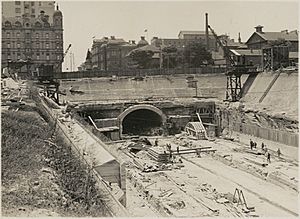
More Stations and the Sydney Harbour Bridge
Next, the "western part" of the line opened in 1932. This included the Town Hall and Wynyard stations. These stations opened at the same time as the famous Sydney Harbour Bridge. This part of the line has four tunnels. Two tunnels connected to the Harbour Bridge. The other two City Circle tunnels ended at Wynyard.
Completing the Circle in the 1950s
Finally, in 1956, the last part of the City Circle was finished. The tracks that ended at St James and Wynyard were connected. The Circular Quay station also opened. This completed the "missing link" of the circle.
Most of the City Circle stations are underground. But Central and Circular Quay stations are above ground. Circular Quay station is even built right under the Cahill Expressway! There are also some old, unused train tunnels. For example, there are former tram tunnels at Wynyard and other short tunnels at St James.
How the Tracks Work
The City Circle has two main tracks. These tracks become four tracks at Central station.
- The outer track is called the "City Outer." Trains on this track travel clockwise around the circle. They pass through Central (platform 17), Town Hall (platform 6), Wynyard (platform 6), Circular Quay (platform 2), St James (platform 2), and Museum (platform 2).
- The inner track is called the "City Inner." Trains on this track travel anti-clockwise. They start from Central (platform 20 or 21). Then they go through Museum (platform 1), St James (platform 1), Circular Quay (platform 1), Wynyard (platform 5), Town Hall (platform 1), and finally Central (platform 19).
Train Services and How They Operate
Different train lines use the City Circle.
- Trains from the Bankstown Line and the Inner West & Leppington Line usually go around the City Circle in the clockwise direction (City Outer).
- Trains from the Airport & South Line usually go around the City Circle in the anti-clockwise direction (City Inner).
- Sometimes, especially during busy times on weekdays, some Bankstown line trains also use the City Inner track.
There are special track connections at Central station. These connections allow trains to switch tracks. This means the train operators can change how trains run if needed.
Trains from the Western and Northern lines usually don't go around the City Circle. Instead, they cross the Harbour Bridge to the North Shore line.
Controlling Train Speeds
Train signals on the City Circle help control how fast trains move. They also make sure trains stay a safe distance apart. In the past, trains could enter a station platform even if the train in front was still leaving. This helped many trains pass through quickly.
However, the system was changed for extra safety. Now, a train must wait until the platform is clear before it can enter. This means fewer trains can pass through each hour, but it makes the system even safer for everyone.
City Circle Stations
The City Circle line has six stations. Here's a quick look at them:
| Name | Code | Distance from Central (km) |
Opened | Notes | |
|---|---|---|---|---|---|
| km | mi | ||||
| Central | CEN | 0 | 0 | 28 February 1855 | |
| Town Hall | THL | 1.21 | 0.75 | 28 February 1932 | |
| Wynyard | WYD | 2.05 | 1.27 | 28 February 1932 | |
| Circular Quay | CQY | 2.97 | 1.85 | 22 January 1956 | |
| St James | SAJ | 4.4 | 2.7 | 20 December 1926 | |
| Museum | MSM | 4.99 | 3.10 | 20 December 1926 | |
| After Museum, the line loops back to Central | |||||
Images for kids
 | Leon Lynch |
 | Milton P. Webster |
 | Ferdinand Smith |


